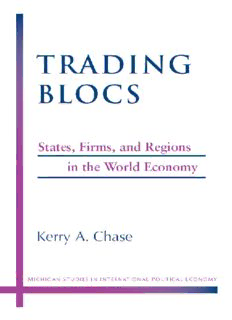
Trading Blocs: States, Firms, and Regions in the World Economy (Michigan Studies in International Political Economy) PDF
Preview Trading Blocs: States, Firms, and Regions in the World Economy (Michigan Studies in International Political Economy)
Trading Blocs Michigan Studies in International Political Economy SERIESEDITORS:Edward Mansfield and Lisa Martin Michael J.Gilligan Empowering Exporters: Reciprocity,Delegation,and CollectiveAction in American Trade Policy Barry Eichengreen and Jeffry Frieden, Editors Forging an Integrated Europe Thomas H. Oatley Monetary Politics: Exchange Rate Cooperation in the European Union Robert Pahre Leading Questions: How HegemonyAffects the International Political Economy Andrew C.Sobel State Institutions,Private Incentives,Global Capital Roland Stephen Vehicle ofInfluence: Building a European Car Market William Bernhard Banking on Reform: Political Parties and Central Bank Independence in the Industrial Democracies William Roberts Clark Capitalism,Not Globalism: Capital Mobility,Central Bank Independence, and the Political Control ofthe Economy Edward D.Mansfield and Brian M.Pollins, Editors Economic Interdependence and International Conflict: New Perspectives on an Enduring Debate Kerry A. Chase Trading Blocs: States, Firms, and Regions in the World Economy Trading Blocs States, Firms, and Regions in the World Economy KERRY A. CHASE The University of Michigan Press Ann Arbor Copyright © by the University ofMichigan 2005 All rights reserved Published in the United States ofAmerica by The University ofMichigan Press Manufactured in the United States ofAmerica (cid:1) Printed on acid-free paper 2008 2007 2006 2005 4 3 2 1 No part ofthis publication may be reproduced,stored in a retrieval system, or transmitted in any form or by any means,electronic,mechanical,or otherwise, without the written permission ofthe publisher. A CIP catalog record for this book is available from the British Library. Library ofCongress Cataloging-in-Publication Data Chase,Kerry A.,1969– Trading blocs :states,firms,and regions in the world economy / Kerry A.Chase. p. cm.— (Michigan studies in international political economy) Includes bibliographical references and index. ISBN-13:978-0-472-09906-1 (cloth :alk.paper) ISBN-10:0-472-09906-X (cloth :alk.paper) ISBN-13:978-0-472-06906-4 (pbk.:alk.paper) ISBN-10:0-472-06906-3 (pbk.:alk.paper) 1. Trade blocs. 2. Trade blocs—History—20th century. I. Title. II. Series. HF1418.7.C53 2006 382'.9'0904—dc22 2005016620 ISBN-13 978-0-472-02289-2 (electronic) For Steph and Ella Acknowledgments I have many people to thank and debts to acknowledge in the writing of this book.Above all I must single out JeffFrieden for being an exceptional scholar, generous adviser,and true friend.Jeffhas served as an indispensable source of sage guidance and unwavering encouragement from the day he agreed to chair my Ph.D.dissertation committee.It has been my great fortune since I came to Tufts to have Jeffso close by,and I look forward to many future conversations with him about political economy,scholarship,and the New York Yankees. I am grateful to all of my colleagues in the political science department at Tufts University for creating an environment of professionalism,community, and good humor.My department chairs,Jim Glaser and Vickie Sullivan,have been extremely supportive.Tony Smith read an early draft of the manuscript and offered excellent advice on how to present key points more effectively.Eliz- abeth Remick has been a terrific colleague and friend. At UCLA,I learned much more from Ron Rogowski and Dick Rosecrance than I could ever communicate.Thanks also to Ben Bishin,Paul Frymer,Alan Kessler,and Chris Layne for giving me insights about political science (as well as diversions from it) over the years. The German Marshall Fund of the United States provided funding for the project.This made it possible for me to write an initial draft ofthe manuscript as a visiting scholar at the Weatherhead Center for International Affairs at Har- vard University.I would like to thank both organizations and the members of their staffwho made this assistance possible. Parts ofchapters 2 and 6 draw from my article “Economic Interests and Re- gional Trading Arrangements: The Case of NAFTA,”International Organiza- tion57 (winter 2003):137–74.I am grateful to International Organizationand Cambridge University Press for their permission to use this article.Thanks also to Robert Feenstra and Deborah Swenson for sharing with me the offshore as- sembly trade data that I use in chapter 6. viii Acknowledgments Jim Reische guided the manuscript through the review process at the Uni- versity ofMichigan Press.I am grateful to him and to Lisa Martin and Edward Mansfield,the Michigan Studies in International Political Economy series ed- itors,for having confidence in the manuscript and being diligent in securing external reviews.Two anonymous reviewers won my appreciation for taking the time and effort to read the manuscript carefully and present their sugges- tions constructively.I thank them for giving me valuable advice on how to im- prove the argument,evidence,and presentation. My parents,Lori and Steve Chase,instilled in me an appreciation for schol- arship,and they have encouraged and supported me in education,career,and life. My beautiful wife Stephanie has provided constant love and emotional support throughout.Since she’s had to live with this manuscript for as long as we’ve been together,I’m sure she will be as happy as me to see it finally in print. And my adorable daughter Ella has spent many of her first days at my side, bouncing, swinging, kicking, and (on rare occasions) napping while waiting for daddy to finish working so he could play. Contents List ofTables xi List ofFigures xiii Acronyms xv chapter 1 Introduction:A World ofTrading Blocs 1 chapter 2 The Argument:Domestic Groups and Regional Arrangements 15 chapter 3 Interwar Trading Blocs:Japan,Britain,and Germany,1919–39 51 chapter 4 The United States and Multilateral Trade Liberalization,1922–67 105 chapter 5 The EU:Fortress or Beachhead? 143 chapter 6 NAFTA:The Politics in the United States 181 chapter 7 Reluctant Regionalism:Japan and Asia 222 chapter 8 Multinationals and the New Regionalism 255 Appendix 271 References 273 Index 299
Description: